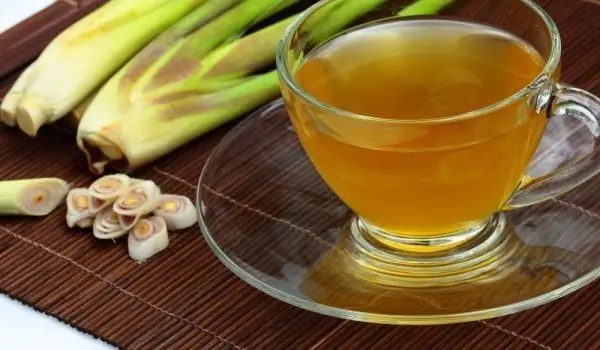2025 Author: Jasmine Walkman | [email protected]. Last modified: 2025-01-23 10:18
Lemongrass / Cymbopogon citratus /, also called cymbopogon is a perennial tropical herbaceous plant of the Cereal family. It has sharp tall leaves, grows in clusters of stems. It reaches a height of 15 cm. The homeland of lemongrass is India, but it is also grown in Sri Lanka, Indonesia, Africa, Brazil and Guatemala.
Over the years, it has established itself as one of the most used spices in Vietnamese cuisine and Thai cuisine. Nowadays it is widely cultivated in California and Florida. It is gradually entering European cuisine, and its fame will soon be worldwide. Lemongrass belongs to the fragrant perennial grasses, with a very strong lemon aroma.
Composition of lemongrass
Raw lemongrass is rich in water, potassium, sodium, magnesium, zinc, phosphorus, manganese, vitamin A, vitamin C and B6. It also contains citronellol and geraniol. The plant is valued mainly because of the essential oil that is found in the leaves. It is rich in citrol - between 80-85%.
Selection and storage of lemongrass
You can be buy lemongrass from exotic spice stands in larger chains. You will find it powdered, paste or canned. Store it according to the instructions on the label. Lemongrass is sold in pots in some online stores. Fresh lemongrass is stored in the refrigerator, in plastic bags, for about 2-3 weeks. You can keep it in the freezer for up to half a year.
Growing lemongrass
Lemongrass is a tropical plant, which in no way tolerates negative temperatures. Loves the sun and should not be left in shady places. The soil should be rich in nutrients, but also permeable. Lemongrass does not like swamping. It should be watered frequently.
Lemongrass in cooking
Lemongrass is an excellent spicebecause it gives a pleasant lemon flavor to dishes without acidifying them - a property typical of lemon. The leaves and stems are used fresh or dried. Lemongrass is extremely popular in Caribbean and Asian cuisine. It is most often used to flavor sauces, soups, various drinks, hot tea, marinades. Its pleasant aroma is extremely suitable for fish, poultry and seafood. Finely chopped lemon grass can also be eaten fresh.
Large pieces or whole stems of lemongrass are added to the dish, and when it is ready, they are taken out. Powdered lemongrass is used to add to beverages.
Benefits of lemongrass
Lemongrass has a lot good action against headaches, fatigue, stress, irritability and inability to concentrate. In addition, it relieves the symptoms of flu and colds, laryngitis, cough and bronchitis. Improves digestion and reduces muscle and joint pain.
Lemongrass oil has well-defined antifungal properties. Helps with insomnia, acts as an antiseptic. It also has repellent properties - the high oil content repels mosquitoes and other unwanted insects. Lemongrass is believed to have good anti-cancer properties - it destroys cancer cells without affecting healthy ones.
To make a decoction of lemongrass, add 1 tbsp. of it in 500 ml of boiling water. Boil under a lid for between 5-10 minutes. Strain and take 150 ml 3 times a day before meals. Of course, it is best to consult a doctor before starting any self-medication course.

Lemongrass tea
Lemongrass tea is a delicious drink with aromas of lemon and mint. Its light taste profile makes it the ideal herb for mixing with other types of tea. This herbal tea also offers in terms of health benefits. Long used as an ancient herbal medicine, science has begun to study the effects of lemongrass tea on human health. Discover the benefits of lemongrass tea and take advantage of it for a more cozy day.
Lemongrass tea is an herbal tea made from the leaves of the lemongrass plant known as Cymbopogon citratus. There are more than 50 varieties of lemongrass plants, but East Indian and West Indian varieties are the most common.
Lemongrass tea has an aromatic profile that combines notes of mint and lemon.
The taste is light and airy with a fresh and invigorating aroma. Lemongrass stalks are often mixed with real teas such as green tea or other herbal teas, including chamomile tea.
Tea can be made using dried or fresh lemongrass stalks.
Lemongrass tea is used as an herbal remedy. It is especially popular in traditional Asian medicines, including Ayurveda and Chinese medicine. Read on to learn more about the scientific basis of the benefits of lemongrass tea.
Health benefits of lemongrass tea
1. Increases immunity
Lemongrass tea is good for the immune system due to the high concentration of vitamins and minerals. Lemongrass tea contains vitamin C and vitamin A, which can help boost immunity and fight infections. Drinking this tea regularly can help boost immune function and prevent colds and flu.
Lemongrass essential oil also has antimicrobial and antibacterial properties that help maintain your immune system at optimal levels. Lemongrass tea also boasts these antibacterial and antifungal properties, which makes it not only a delicious drink, but also healthy.
2. Source of antioxidants
Lemongrass tea contains high concentrations of antioxidants, including polyphenols, chlorogenic acid and catechins, which work to protect healthy processes in the body. Free radicals are highly reactive cells that have uncharged atoms and can cause deterioration in healthy human cells. Free radicals can be caused by pollution, exposure to carcinogens and are naturally produced in the body.
Drinking lemongrass tea can help slow down the effects of free radicals and can help eliminate excess from the body. Antioxidant properties act slowly to prevent oxidative stress - the form of rust in the body.

3. Take care of your heart health
The regular drinking lemongrass tea can help protect the heart from cardiovascular disease. This is because this tea has anti-inflammatory properties that help improve red blood cell circulation and reduce the risk of heart attack and blood clots. It can also help modulate risk factors for heart disease such as cholesterol.
A study published in the Medical Forum monthly examines the effects of lemongrass and green tea on blood pressure. The observational study consisted of 72 men who consumed green tea, lemongrass tea or placebo. The researchers observed a moderate reduction in high blood pressure in the group who drank lemongrass tea.
Lemongrass tea can also offer beneficial effects on cholesterol. Studies published in the Journal of Advanced Pharmaceutical Technology and studies have found that animals receiving lemongrass oil show a significant reduction in total cholesterol levels. Additional studies also support the cholesterol-lowering benefits of lemongrass oil and lemongrass extracts.
4. Helps to lose weight
Lemongrass tea can help you lose weight when combined with a healthy diet and regular exercise. This herbal tea naturally has zero calories, which makes it a great substitute for boring old water. It is also a good substitute for sweet soft drinks due to its aromatic nature.
Lemongrass is also a natural diuretic that can help you lose weight quickly before a big event. Just be sure to limit the added sugars and sweeteners to prevent this healthy drink from turning into a sugar-laden nightmare.
5. Good for women's health
Lemongrass can help reduce pain such as menstrual cramps due to its anti-inflammatory properties. Studies published in 2011 also show that lemongrass tea may be helpful in treating hot flashes.
This is because the drink offers a natural calming and cooling effect that can fight stress and fever. It can even help regulate menstrual flow thanks to the benefits of blood circulation.
6. Facilitates digestion
Drinking lemongrass tea can help balance the health of the digestive system. The anti-inflammatory properties of this tea can help soothe irritated stomach muscles that cause cramps and bloating. It can also help relieve stomach pain and nausea. Studies published in the Journal of Young Pharmacists have found that lemongrass essential oil helps prevent stomach ulcers.

Side effects of lemongrass tea
Lemongrass tea has very few side effects when consumed in moderation. Consumption of large amounts of this tea can lead to stomach pain and nausea.
Another common side effect is an allergic reaction. Avoid drinking this tea if you are allergic to lemongrass leaves or the plant. Discontinue use if you have allergy symptoms such as sneezing or skin rash.
Lemongrass tea can interact with certain medications. Always seek medical advice from a qualified health care professional before drinking herbal teas if you suffer from a medical condition or are taking any medications.
You can find lemongrass tea at local health food stores. Just add a teaspoon of dried tea leaves to a glass of boiling water and let it steep for 5 to 10 minutes. Pour yourself a cup of lemongrass tea and enjoy the health benefits and delicious aromas of this refreshing drink.

Lemongrass oil
Lemongrass essential oil has a very good antioxidant, invigorating and soothing effect. Relieves skin eczema, controls sebum secretion and shrinks enlarged pores. Lemongrass has a good deodorizing effect and reduces sweating. Fights cellulite and acne successfully. It is used very often in perfumery because of its strong but at the same time pleasant aroma.
For anti-cellulite massage, mix 20 drops of essential oil and 50 ml of almond oil. Rub vigorously into the skin. If you want to get rid of the unpleasant enlarged pores, mix 30 ml of almond oil and 2 drops lemongrass. Apply on face, leave on for 10 minutes and wash thoroughly with lukewarm water.
To treat acne, make a mixture of 2 drops of sage, 2 drops of lemongrass and 10 ml of almond oil. Apply on face and rinse thoroughly for 10-15 minutes.
If you want to take a bath that has both an invigorating and anti-cellulite effect, prepare a bath in which 10 drops of lemongrass and sea salt are dissolved.
Harm from lemongrass
Lemongrass oil is contraindicated in pregnancy, epileptics and children under 3 years of age. Be careful at the first contact with the oil, because it is possible that an allergic reaction may occur.
Recommended:
Lemongrass Tea - Benefits And Application

We've all heard of lemongrass. But what it is useful for, what it is used for, how we can get all the useful substances and properties from it, we will tell you in this article. Lemongrass it can also be called a spice because it is very tasty.
Culinary Use Of Lemongrass

Lemongrass is also called citronella. It has a bright and fresh aroma of lemon and over 50 varieties. It is distributed mainly in the tropics and temperate zones. It is a perennial plant with long and sharp and tall leaves. From it the leaves in the ground part of the grass are used.
Mint, Lemongrass And Rosehip - A Powerful Combination Against Fatigue

If you have increased irritability, insomnia, intolerance to loud noise and bright light with very fast fatigue, you can help yourself with herbs. Mint leaves indicate antimicrobial, anti-inflammatory and sedative effects. In our daily busy day with the lack of rest, fatigue appears, which in most cases becomes chronic.

